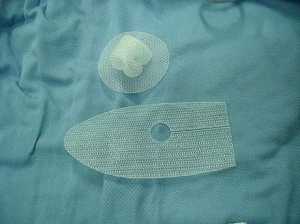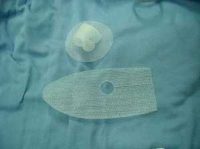
19 Sep Why Do Surgical Mesh Products Fail?
MedicalResearch.com Interview with:

Polypropylene (PP) mesh is currently used in both hernia and pelvic organ prolapses – Wikipedia Image
Professor David Taylor
Trinity Centre for Bioengineering
Trinity College Dublin
The University of Dublin, Ireland
MedicalResearch.com: What is the background for this study?
Response: The study was motivated by the emerging clinical problem of the failure of surgical mesh products used for transvaginal operations. Increasing numbers of women are experiencing the failure of mesh used to treated vaginal prolapse, urinary incontinence and other pelvic organ conditions.
I carried out a survey of all existing research, including medical case reports, meta studies of clinical outcomes and biomechanics research on the material, which is a knitted plastic mesh. A phenomenon known as “mesh erosion” causes damage to surrounding tissues and organs and can leave the person in severe and lasting pain.
MedicalResearch.com: What are the main findings?
1.The clinical rates for mesh erosion are unacceptably high for organ prolapse operations (average 10%, rising to almost 30% in some studies).
2. Clinical rates for mesh erosion in urinary incontinence products are lower (2-3%) but the outcomes are equally severe.
3. Currently it is not understood how or why these products are failing. My biomechanics analysis suggests that the mesh material itself should not break unless it becomes degraded and weakened during its time in the body. There is some evidence for this degradation (perhaps caused by bacteria).
4. Poor surgical technique by some doctors may also be a factor.
MedicalResearch.com: What should readers take away from your report?
Response: Before agreeing to any type of surgery involving mesh, one should enquire carefully from the surgeon as to the failure rates for this particular product, the surgeon’s own personal success rates and the possible worst-case consequences resulting from failure of the product.
If you have experienced difficulties with transvaginal mesh products you should consider taking legal action.
MedicalResearch.com: What recommendations do you have for future research as a result of this work?
Response: Further research is needed, especially the examination of fragments of mesh removed from affected patients, to determine the failure mechanisms.
Citation:
[wysija_form id=”3″]
[last-modified]
The information on MedicalResearch.com is provided for educational purposes only, and is in no way intended to diagnose, cure, or treat any medical or other condition. Always seek the advice of your physician or other qualified health and ask your doctor any questions you may have regarding a medical condition. In addition to all other limitations and disclaimers in this agreement, service provider and its third party providers disclaim any liability or loss in connection with the content provided on this website.
Last Updated on September 19, 2018 by Marie Benz MD FAAD
